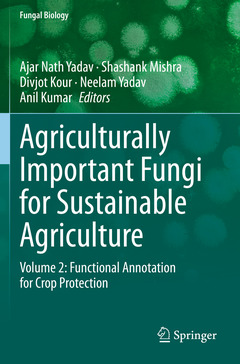Agriculturally Important Fungi for Sustainable Agriculture, 1st ed. 2020 Volume 2: Functional Annotation for Crop Protection Fungal Biology Series
Coordonnateurs : Yadav Ajar Nath, Mishra Shashank, Kour Divjot, Yadav Neelam, Kumar Anil

Microbes are ubiquitous in nature. Among microbes, fungal communities play an important role in agriculture, the environment, and medicine. Vast fungal diversity has been found in plant systems. The fungi associated with any plant system are in the form of epiphytic, endophytic, and rhizospheric fungi. These associated fungi play important roles in plant growth, crop yield, and soil health.
The rhizospheric fungi present in rhizospheric zones have a sufficient amount of nutrients released by plant root systems in the form of root exudates for growth, development, and activities of microbes. Endophytic fungi enter in host plants mainly through wounds that naturally occur as a result of plant growth, or develop through root hairs and at epidermal conjunctions. The phyllospheric fungi may survive or proliferate on leaves, depending on the extent of influences of material in leaf diffuseness or exudates.
The diverse group of fungal communities is a key component of soil-plant systems, where they are engaged in an intense network of interactions in the rhizospheric, endophytic, and phyllospheric areas, and they have emerged as an important and promising tool for sustainable agriculture. These fungal communities help to promote plant growth directly or indirectly by mechanisms for plant growth-promoting (PGP) attributes. These PGP fungi can be used as biofertilizers, bioinoculants, and biocontrol agents in place of chemical fertilizers and pesticides in an environmentally and eco-friendly manner.This book covers the current knowledge of plant-associated fungi and their potential biotechnological applications in agriculture and allied sectors. This book should be useful to scientists, researchers, and students of microbiology, biotechnology, agriculture, molecular biology, environmental biology, and related subjects.
Ajar Nath Yadav is an Assistant Professor (Sr. Scale) in Department of Biotechnology, Dr. Khem Singh Gill Akal College of Agriculture, Eternal University, Baru Sahib, Himachal Pradesh, India. He has 4 years of teaching and 10 year of research experiences in the field of Microbial Biotechnology, Microbial Diversity, and Plant-Microbe-Interactions. Dr. Yadav obtained doctorate degree in Microbial Biotechnology, jointly from IARI, New Delhi and BIT, Mesra, Ranchi, India; M.Sc. (Biotechnology) from Bundelkhand University and B.Sc. (CBZ) from University of Allahabad, India. Dr. Yadav has 136 publications, which include 69 research/review papers, 11 books, 54 book chapters, and 02 patents with h-index of 27, i10-index of 64, and 2287 citations (Google Scholar). Dr. Yadav has published 111 research communications in different international and national conferences. Dr. Yadav has got 12 Best Paper Presentation Awards, and 01 Young Scientist Award (NASI-Swarna Jyanti Purskar). Dr. Yadav received “Outstanding Teacher Award” in 6th Annual Convocation 2018 by Eternal University, Baru Sahib, Himachal Pradesh. He has been serving as an editor/editorial board member and reviewer for more than 35 national and international peer-reviewed journals. He has lifetime membership of Association of Microbiologist in India, and Indian Science Congress Council, India.
Shashank Mishra is presently working as Scientist ‘C’, Biotech Park, Lucknow, Uttar Pradesh, India. He obtained his doctorate degree in Science “Industrial Biotechnology” in 2015, from Birla Institute of Technology, Mesra, Ranchi, India; M.Phil. (Biotechnology) in 2008 from Alagappa University, Tamil Nadu; M.Sc. (Botany), in 2005 from Dr. R.M.L. University, Ayodhya; M.Sc. (Biotechnology), in 2004 from Barkatullah University, Bhopal and B.Sc. (Botany and Chemistry) in 2001 from Dr. R.M.L. University, Ayodhya, India. He has made pioneering contributions in the area of
Date de parution : 08-2021
Ouvrage de 370 p.
15.5x23.5 cm
Date de parution : 08-2020
Ouvrage de 370 p.
15.5x23.5 cm



